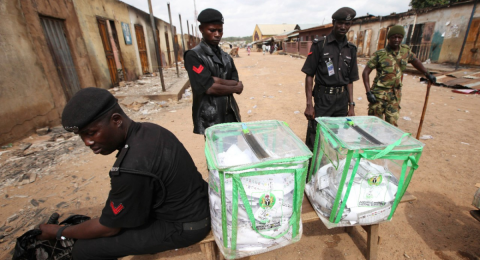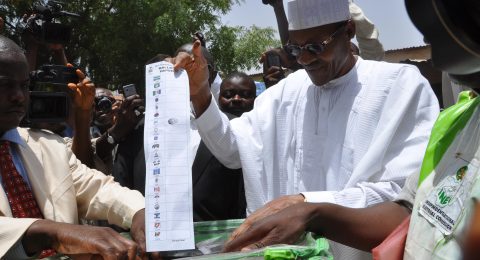Nigerian President Goodluck Jonathan and labor unions failed to reach a compromise over government-subsidized fuel prices, but the unions said oil workers would not shut down crude output while the two sides kept talking.
“The meeting is not deadlocked but we have not reached a compromise,” Nigeria Labor Congress President Abdulwaheed Omar told reporters after a meeting at the presidential villa went on until late Saturday night.
“We will meet and return to talk with the government. Our position is that they should suspend the increase in the pump prices and then we will suspend the strike and start negotiations.
“
Tens of thousands of people took to the streets and staged strikes for five successive days last week in protest against the removal of a fuel subsidy on January 1 that raised the price of petrol at the pump to 150 naira ($0.93) per liter from 65 naira.
Workers in Nigeria’s 2 million barrel-per-day oil industry – it accounts for 8 percent of U.S. oil imports and is also a key source for Europe and Asia – had threatened to halt production by Sunday.
“PENGASSEN (the oil workers union) will not shut down oil production as earlier planned for Sunday,” said Omar.
But the union itself said in a statement that it would shut down production immediately if talks broke down.
“All PENGASSAN branches and members at all the production platforms … (will) execute immediately the systematic shut-down of oil production should the negotiation with the government break down,” it said.
Industry officials doubt unions can stop crude oil exports completely because production is largely automated and Nigeria has crude stored in reserves, but even a minor outage could have a significant impact on the economy.
Even if oil output stayed in place, the strikes were costing Africa’s second-biggest economy around $600 million a day, Central Bank Governor Lamido Sanusi told Reuters Thursday.
It was not clear when talks would resume but it seems unlikely a deal can be reached before strikes are due to restart Monday.
“We are going to continue our deliberation at our organization level and then maybe we will see the way forward,” said Omar.
Unions suspended strike action for the weekend because of Saturday’s talks.
Crude oil exports account for more than 90 percent of Nigeria’s foreign exchange earnings and 80 percent of government revenues.
NO COMPROMISE
Omar said the unions were still insisting on having the subsidy put back fully, which the government is unlikely to agree to, at least without a concession allowing it to phase it in later.
“Let’s go back to 65 naira then we agree on a new line of action,” he said. Asked if the unions were still absolutely insisting on that, he said: “For now, yes.”
Tankers have been unable to deliver supplies to Nigeria, which despite its oil riches, imports most of its refined petroleum products.
Saturday, motorists formed a long queue at one filling station near central Lagos, Nigeria’s largest city, in a search for fuel that after a week of strikes was not readily available even at the new higher price.
Nearby a young man peddled black market petrol, using a hose spouting out of a jerrycan. “I have fuel for 350 naira a liter if you want,” he said.
Eurasia Group’s Philippe de Pontet in a research note late Friday suggested a combination of union intransigence and Jonathan’s banking on workers tiring of the strike could mean no deal was reached by Monday.
The confrontation is a serious setback for Jonathan, already under fire for failing to quell an increasingly violent Islamist insurgency in the north.
Source: Reuters











